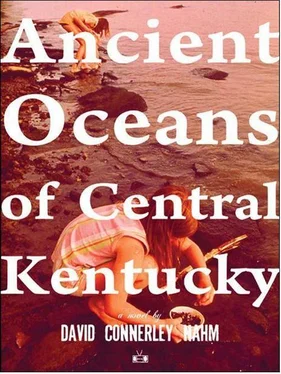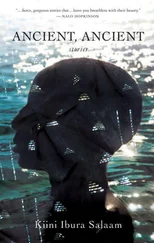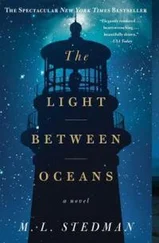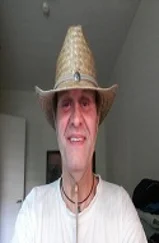Clean and gleaming aisles of goods. Green plastic buckets perfectly molded, sponges, bleach of every sort, chlorine bleach, oxygen bleach, bleaching powder. She watched the people moving through the aisles. She caught her reflection in the door of the freezer case and was lost for a moment, remembering those passing cars, the cows in the field and the bull in the roots, the blue barrel and her face in it, her grandfather’s unbreakable silence and her parents finally coming to take her back home, back to the house where she now had a room to herself, and then exhaling, the moment broken, she looked at the time and walked to the checkout lane and the surface of the blue barrel shattered. She turned, thinking she heard someone calling her name, but no one was there.
Her grandfather’s house was a small blue egg in a dirty palm. A blue house at the edge of an orange pasture between low lime hills crowned with bare black trees. Orange pastures and lime hills with gray lines of slave walls, slumping rocks that were cool when she touched them, speckled with yellow lichens and tufts of dark green moss. Walls that were the same gray as the jutting limestone rising from the ground all around the fields, stuttering stones, accidental menhirs , worn into existence by rainwater running off of the face of the sun-warmed hills. During the day, the stones cast shadows that didn’t mark the passing of much of anything. At night, one or another of these limestone teeth would occasionally align with some distant glowing body, but most of the time they did not, choosing instead to simply point off in a direction that contained nothing all the way until the end.
Leah remembered all of this, though she never talked about it. When she would think about that summer, she remembered that it was warm, but she could not remember what that warmth felt like. She knew that she spent the summer there with her grandfather after Jacob was gone, but those memories felt out of place in the logbook of her life, as though they were extra scenes from some other existence that she’d happened upon. She saw herself from a distance.
Dumb brown beasts wandered about their bounded spaces, heads down, chewing grasses into submission. They bellowed evenings beneath black skies speckled with nameless fires, fires he knew were likely long since lost, cold orbs, empty space, darkness, only their last waves cast down to this house through everything. The bands of light that spilled across the dome above her flickered and warbled like its twin that lived on the surface of the water in the barrels behind the house when she dipped in her hand. Rippling waves destroying the universe. She sipped the cold water from her cupped palm and waited to see how long after her grandfather called her to come in she could linger outside before he’d come looking for her, shouting her name into the darkness. She stood waiting, listening for him to call her name again. She was not thirsty, but she loved to see the still face sent aflutter and the galaxy destroyed.
From the attic window of the farmhouse, an octagon of glass, she could see the fields and trees and hills and rocks swim into one another beneath the prismatic dusk. A confusion in the growing dark. Some nights, when clear, high on far-flung hilltops she could make out other lights, the lights of the other families, and beyond them, against a night’s low clouds, the pale light of the small town. At night, the dark was dark beyond dark, dark to the point of being truly void. Even the moon at its most pregnant did little to lift the oozing black. Each cricket’s chirp, rather than filling the void with some small movement, only sounded the extent of the emptiness. Day and night there was only the cacophonous roar of nature, a throbbing thrum of insect and animal life chattering like cold teeth on a bone, the clickity-clucking of hard-shelled creepers and segmented crawlers that the mind could not fathom the splendor of, the soprano trilling twitters of bright yellow and red sylvan oddities, the howls of hounds harrowing the valley like a rude blade with a taste for soil. Even the plants, still and detached, made noises: slim rustles and whistles, dry cracks and moans. All a spray of color and scent, sound and warmth rising in tired waves over and over, never ending, never dying, only growing and churning itself back into growth, churning back on the small farmhouse that sat at its center. All of creation fading into one indistinct, luminous mass and she hated everything about it. The leaking sap, the trickling streams, the scampering paws. She sat in that window, looking out into the unlimited darkness, past the few faint lights that marked the edge of the world, and thought of the distant town. The endless plain of light and motion. People pressing against one another. Voices thronging up. Machines and glass. One humming note unable to be noted on any known staff, a note more complex and majestic than anything that Nature ever dreamed of. That town and then beyond, the flickering flecks of the milk strewn across the sky, other suns and rocks and moons and the things that flittered between them the way the cows lumbered between clover and cistern. All spiraling and blinking forever.
One morning, before her grandfather was up, she slipped out of the door, and down the path, toward the trees. In the pale of the moon you could see her, a minnow darting from the porch to the fence, through the rows of corn, hair disappearing, blue dress drained of color, then gone, passed into the woods. When he woke and could not find her, he went outside, hollering for her, dressed only in the long johns he slept in and a hunting jacket that was by the door. He hollered and hollered her name, kicked across the fields, down by the stream, through the trees, and found her sitting on a knot of roots. Relief gave way to a sharp anger, and relief that he’d not called her parents right away. “Leah!” he said. She looked up startled, her face red and wet, and he softened, breathing deep, releasing the hard words that were so quick in him, and he took her hand and lifted her up and dried her face and said, “Why did you do that? I didn’t know where you were. Do you know what I thought? Do you know what your parents would have thought? Oh, do you know what that would have done to them?” and she didn’t respond, but felt sick to her stomach with shame and anger and some terrible feeling that she did not have the words to name. Later, her grandfather took her out to the far side of the corn, to the edge of the wood. The house invisible from that point. “What, what?” Leah asked, staring at her feet as she walked through the rows, kicking clods. He didn’t respond. Then she saw it. The small doe. Brown and white fur flat against shivering body. Black eyes, wet, like cupfuls of water scooped at night. Nose. Tongue. It lay in the sparse green grass at the foot of the wood. She was about to ask her grandfather why it was covered in amaryllis when she realized. The woods heaved with animals that coursed through the woods like silverfish through a library. The doe was still alive. She could feel her heart beating with her eyes. Her grandfather handed her a knife. Heavy, clean. “She’s in pain,” he said. He held her hand to its wet throat.
And then the summer ended and Leah came home to begin fifth grade at Edna L. Toliver Elementary School.

And now somewhere her little brother was scared, was in pain, was dead, was—
“Leah,” her mother said, “Hush. Please, God. Hush. It is time for school.”
She didn’t know what to expect when she saw her classmates. She’d seen no one she knew since it happened. Several of her classmates’ parents had called in the days that followed to offer their support to the Shepherds, and Mrs. Shepherd told Leah that a few of her classmates had called themselves, probably at the prodding of a parent, but Leah hadn’t talked to anyone. She’d just been in her room, waiting, certain that at some point her parents would come in, faces red with rage, realizing that this was all her fault, ready to peel her skin off with a belt. She sat in homeroom and waited for the bell and the pledge and the anthem, and her classmates, children she’d been in school with since kindergarten, or before in some cases, filed in and sat in desks as directed by the teacher, a heavyset man with a gray crest of perfectly structured hair, and they talked to one another loudly and they fidgeted and fussed and some fussily put away the new year’s supply of paper and glue and some turned and looked at her and then leaned together to whisper. Their whispers scissored through her skin. After morning announcements, they began learning math. At lunch Leah sat alone. Rectangular pizza on soft white bread and a half pint of chocolate milk. At recess, Leah sat on the swings. Then the day ended.
Читать дальше













